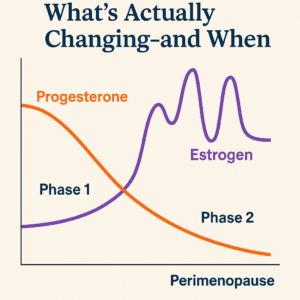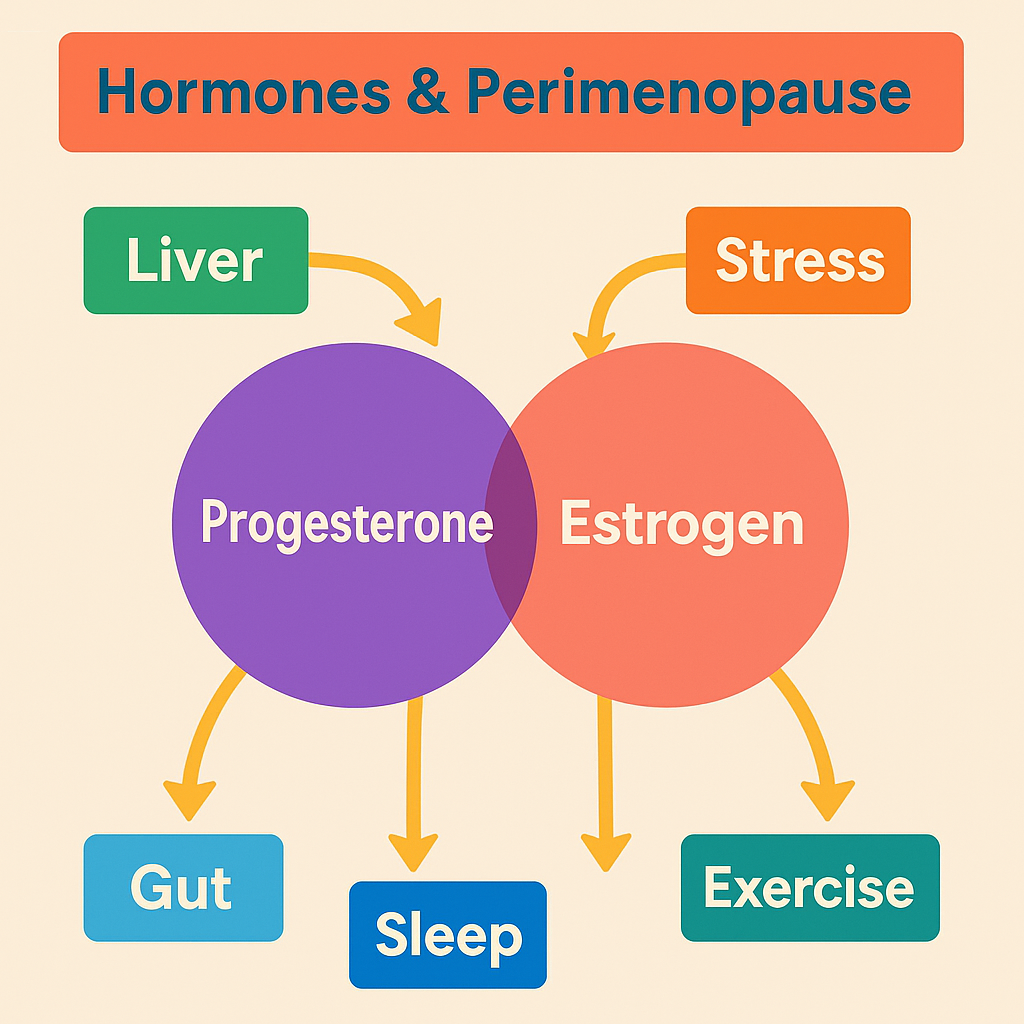At Pelvic Path Physical Therapy in Marin County, we believe women deserve care that’s as individualized as their bodies. Recently, we hosted a workshop with Rachel Schaefer, L.Ac., Functional Medicine and Nutrition Clinician, whose decades of experience in acupuncture, herbal medicine, and functional medicine have guided countless women through hormonal transitions with precision and compassion.
This article summarizes insights from Rachel’s talk, “Personalizing Perimenopause & Menopause: What Most Women Aren’t Being Told.”
The perspectives below reflect Rachel’s clinical expertise and functional medicine background. While some of our collaborating physicians and referral partners may hold differing views on certain details, we value respectful dialogue across disciplines.
At Pelvic Path, we work closely with each client’s medical team—including gynecologists, endocrinologists, and primary care providers—to ensure care that’s safe, integrated, and evidence-informed.
The information below is for education, not diagnosis, and is designed to help you understand your body better and make more informed decisions with your healthcare providers.
The Big Myth: “You can’t test hormones in perimenopause.”
You can—and often, you should. Especially before starting hormone replacement therapy (HRT).
-
Blood labs can time progesterone and estradiol to your cycle phase.
-
At-home tools (for LH, estrogen, and progesterone) show daily hormone fluctuations.
-
Context testing—liver function, nutrient status (iron, B vitamins, zinc), and gut microbiome—reveals how your body metabolizes both natural and prescribed hormones.
Why it matters: Two women can take the same estrogen dose and experience completely different results. Personalized testing helps correct the inputs—gut, liver, and nutrient levels—so hormones can do their job effectively.
What’s Actually Changing—And When

Phase 1: Progesterone Drops First
As ovarian function fluctuates in your 40s, ovulation becomes less consistent—meaning less progesterone.
Progesterone is your cycle’s metronome and a calming signal for GABA, the brain’s “peacekeeper” neurotransmitter.
Common signs:
-
Heavier, closer-together periods
-
Anxiety, rumination, feeling “on edge”
-
Lighter sleep before bleeding
-
Escalating PMS
What helps: Bioidentical progesterone (cyclic, when indicated) or targeted botanicals (like Vitex), guided by lab testing.
Phase 2: Estrogen Becomes Erratic (Then Falls)
Estradiol surges and dips—the “ketchup bottle” phase—before trending down. Low or volatile estrogen impacts:
-
Insulin sensitivity → easier belly fat gain
-
Cholesterol → rising lipids even with a healthy diet
-
Mood and motivation → estrogen supports serotonin and dopamine
-
Sleep depth → early wakings and heat spikes
What helps: Transdermal bioidentical estrogen (never oral) when indicated, combined with a gut and liver support plan for clean metabolism.
Birth Control ≠ HRT
Oral contraceptives suppress ovulation and use synthetic progestins, not body-identical progesterone.
That means you miss progesterone’s natural GABA-calming benefits—and in midlife, calm is medicine.
Modern HRT uses bioidentical hormones, personalized to your labs, symptoms, and risk profile.
Your Gut & Liver: The Hidden “Hormone Organs”
Estrogen is packaged by the liver and excreted via the gut.
If inflammation, dysbiosis, or alcohol “unpack” estrogen, it reenters circulation—fueling symptoms like bloating, mood swings, and fatigue.
This estrogen–microbiome connection (the estrobolome) is why hormone balance often includes:
-
Gut support and fiber diversity
-
Targeted nutrients (iron, B’s, zinc) for detox enzymes
-
Limiting alcohol while rebalancing hormones
Stress Isn’t a Side Issue. It’s the Issue.
Midlife piles on stress—kids, careers, aging parents, constant pings.
If your body only gets high-intensity stimulus (fasted workouts, caffeine), you’re telling it to store fat and fragment sleep.
Try this instead:
-
Train your parasympathetic system with breathwork, yoga nidra, or acupuncture.
-
Lift weights 2–4x/week to preserve muscle and metabolic balance.
-
Ease up on excessive cardio that spikes cortisol without real results.
At Pelvic Path, we specialize in perimenopause strength training in Marin County—helping women stay strong, lean, and injury-free during hormonal change.
About That Belly Fat
As estrogen declines, insulin sensitivity drops, driving fat storage—especially around the belly.
We use DEXA scans and lab data to personalize your training, nutrition, and recovery to restore insulin balance.
Why We Don’t Recommend Skipping Breakfast
Intermittent fasting can backfire for midlife women. Most benefit from finishing dinner earlier, not skipping breakfast.
-
Sleep is catabolic—you wake up breaking down muscle.
-
A protein-rich breakfast (30–40g) jumpstarts metabolism and stabilizes glucose.
-
Fasted HIIT + coffee = cortisol surge → more visceral fat.
Use CGMs (continuous glucose monitors) to find your carb tolerance, and aim for ~100g protein/day. Balanced meals keep energy steady and support muscle tone.
Supplements: Keep It Targeted and Clean
We’re food-first and lab-led, but some staples often help:
-
Creatine monohydrate (5g/day): boosts strength and cognition.
-
Omega-3s: reduce inflammation and support brain and heart health.
-
Vitamin D: dose by lab results, not trends.
-
Iron: only if ferritin is low, and use gentle forms.
Everything else depends on your labs, meds, and goals.
Our Clinical Process: No Protocols—Just Precision
Each plan is bespoke, but common building blocks include:
-
Hormone assessment (timed labs + tracking)
-
Context labs (liver, nutrients, insulin, lipids)
-
GI/microbiome testing
-
DEXA for body composition
-
Wearables (CGM) to personalize training
We set priorities, pace changes thoughtfully, and build confidence—not dependency.
What Relief Can Look Like
-
Cycles normalize or post-menopause symptoms ease
-
Anxiety lowers, sleep deepens
-
Strength and energy improve
-
Body composition shifts in a positive direction
-
Labs confirm that physiology matches how you feel
Recommended Reading
-
Estrogen Matters — Avrum Bluming, MD
-
The XX Brain — Lisa Mosconi, PhD
The Takeaway
Menopause isn’t a disorder—it’s a transition.
When you personalize your inputs—hormones, gut, liver, stress, sleep, movement, and nutrition—you transform your outcomes.
That’s where lasting relief and vitality live.
Ready to Learn More?
If you’d like to explore hormone health in greater depth, Rachel Schaefer offers personalized consultations in functional medicine, nutrition, and acupuncture.
If you’re ready to build strength, prevent injury, and train wisely for the menopause shift, the team at Pelvic Path Physical Therapy in Marin County specializes in pelvic health, strength training, and holistic physical therapy for women.
➡️ Contact Pelvic Path Physical Therapy to start your personalized plan for midlife strength and hormonal balance.
About the Presenter
Rachel Schaefer, L.Ac., Functional Medicine & Nutrition Clinician
Rachel has been in clinical practice for over 20 years. Trained as a licensed acupuncturist and herbalist, she later pursued advanced studies in functional nutrition and functional medicine. Her curiosity and commitment to lifelong learning—both from science and her patients—shape her holistic approach to women’s health.
Rachel practices At Ginko Integrative Medicine in Corte Madera, CA, where her team includes a nurse practitioner, health coach, and aesthetic acupuncturist, offering comprehensive care in hormone, gut, and endocrine health.
Blog developed from Rachel Schaefer’s workshop, hosted by Pelvic Path Physical Therapy. The content reflects the views and expertise of the presenter and is shared for educational purposes only. Pelvic Path maintains collaborative relationships with medical providers and honors all evidence-based approaches to women’s health.

